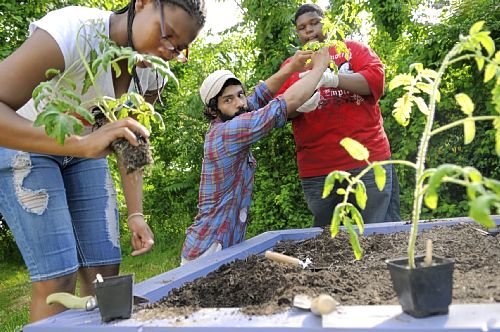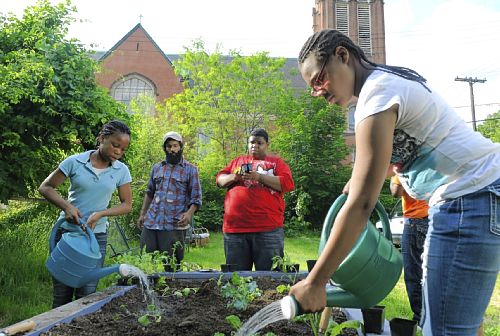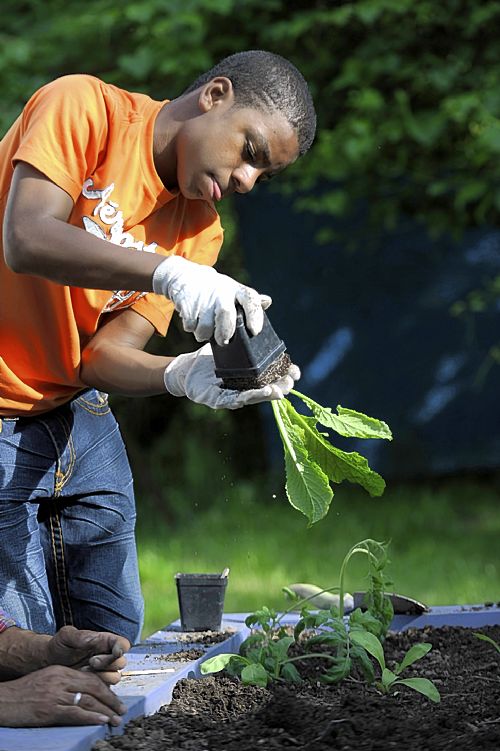
Cities, Including Pittsburgh, Are Turning Green With Urban Farms
The urban farm — a novel, even whimsical, idea a few years ago in Pittsburgh — is now a movement so fully fledged that a neighborhood without one seems almost an anomaly.
Nationally, the movement is profuse, with seeds in the 1980s when foodies sprouted and gourmet eating went mainstream. The roots of several movements have intertwined since: urban enterprise farms, urban farms for educating children, community gardens, vacant lot greening, soil remediation of industrial landscapes, community supported agriculture, backyard chickens and bee hives, consumers who buy into livestock with farmers and grocery chains selling local produce.
Grow Pittsburgh, whose mission is to support urban gardening, is a 5-year-old nonprofit that can’t keep tabs on the number of gardens being planted in the city’s public spaces, said Julie Butcher Pezzino, executive director.
Grow Pittsburgh is a partner of groups operating gardens in Braddock, Lawrenceville, Larimer and Lemington. It is searching for a suitable plot Uptown and has Troy Hill and Hazelwood on schedule for next year.
An online search of terms such as “urban farm,” “sustainable food” and “buy local” shows how robust the movement is in other cities. Interest here has skyrocketed.
Grow Pittsburgh’s latest foray is to widen its scope. It is working with Allegheny County and the Western Pennsylvania Conservancy in a pilot program to encourage gardening partnerships outside the city. It is currently developing projects in Millvale and McKees Rocks.

Rebecca Droke/Post-Gazette --- Jayda Harden, 14, left, with Mark Williams, center, and Brandon Kenney, 14, plant tomatoes in a raised bed for the Lots of Hope gardening project at The Pittsburgh Project on the North Side.
It has also collaborated with McAuley Ministries, the granting arm of Pittsburgh Mercy Health System, GTECH Strategies, the Pittsburgh Housing Authority, the A. Randolph Institute and the Greater Pittsburgh Community Food Bank to create the Francis Street Community Garden and Urban Farm Project on approximately 1 1/2 acres at Bedford Avenue and Francis Street in the Hill District.
McAuley Ministries granted $37,580 to the project. Produce from that garden will be sold to the Greater Pittsburgh Community Food Bank for distribution through a farmers market and farm stands located at the Hill House and Addison Terrace.
“In the last two or three years, we have gotten calls upon calls from people asking for help and technical assistance” in starting a community farm, said Ms. Butcher Pezzino. “We are still developing our policies” on partnership standards. “It’s new for us to be helping so many groups.
“One of our goals is to start trying to document and find where all the places are” that have not relied on Grow Pittsburgh’s help. “I’ve gotten calls from people asking if we are partners in gardens that I have never heard of.”
A lot of things happened last year to help the momentum nationally:
The U.S. Department of Agriculture’s “Know Your Farmer, Know Your Food” campaign kicked into gear last summer, giving USDA employees the directive to consider starting their own gardens.
First Lady Michelle Obama planted a kitchen garden at the White House.
The movie “Food Inc.” opened a lot of eyes to the ways and means of corporate food agriculture.
The movement is further bolstered by occasional recalls and reports of tainting.
Among the oldest and most successful urban agriculture projects are the Food Project in Massachusetts, which started in 1992 and has mushroomed to include numerous acres throughout the Boston area, including inner-city Roxbury. It has 25 full-time staff, employs 100 youth and attracts 2,000 volunteers each year. It sells and donates more than 250,000 pounds of food each season. It is also a source of food for community-supported agriculture, or CSA, subscribers.
Will Allen’s Growing Power Inc., founded in 1995 in Milwaukee, was recently hailed at the Women’s Health & the Environment Conference in Pittsburgh. Growing Power has become a national advocate that trains and offers technical support to communities in growing food and selling it.
Urban Farming, a Detroit nonprofit, grew from a pilot of three gardens in 2005 to 600 gardens across the country today. Its mission is to take over vacant space, grow food and give it away to people who live nearby.

Rebecca Droke/Post-Gazette --- Ceasia Williams, 14, left, and Jayda Harden, 14, water newly planted seedlings in a raised bed for the Lots of Hope gardening project at The Pittsburgh Project on the North Side.
Braddock Farms was not the area’s first big garden on public land when Grow Pittsburgh established it in 2007, but it set a standard for what “urban farm” means locally. On three-quarters of an acre, it may be the largest nonprofit farm in Allegheny County and is the leading “enterprise” farm. A dozen area restaurants buy produce from it.
“We have developed a market base within the high-end restaurant community for our produce from there,” said Ms. Butcher Pezzino, “but it is not yet sustaining itself.”
The Pittsburgh Project in Perry South has expanded the size and scope of a teaching garden for its summer youth over three years. The Lots of Hope project not only broadens children’s understanding of food and nutrition, it also teaches them how to run a small business — a farm stand — and the value of supplying food to their neighborhood.
“We started the farm as a food access initiative,” said Jonathan Young, an AmeriCorps worker. The neighborhood is hilly and lacks a grocery people can walk to. The Project last year got the city’s permission to farm on an abandoned baseball field near its Charles Street campus. It will expand its Thursday farmers market and deliver what it doesn’t sell to the elderly in nearby high-rises.
The Thursday farmers market season at the Project began June 10; the hours are 2 to 6 p.m.
Last year, Mr. Young said, the farm stand made enough to cover its costs; infusions of food from the Greater Pittsburgh Community Food Bank help during lean growing times.
“My hope this year is that 30 percent of the operating budget is covered by revenues from our farm stand,” he said. The Project has its first commercial buyer of produce — Bistro to Go on East Ohio Street in Deutschtown, which is also sharing its organic waste so the Project can accumulate compost.
“These are exciting times,” said Mr. Young.
Grow Pittsburgh’s sites include the Larimer Farm and Gardens, a quarter acre at Larimer Avenue and Mayflower Street; Lawrenceville Gardens at Allegheny Cemetery, about 150 square feet; and a garden the size of four city lots on Lincoln Avenue in Lemington called Higher Ground Community Garden.
The Larimer site got grant funding so Grow Pittsburgh could hire a part-time manager, said Ms. Butcher Pezzino, “someone who is there 20 hours a week and can keep it looking good. That could be an awesome model.”
Larimer’s site is a community garden and a farming effort of the Larimer Green Team.
“They’re calling it a farming garden” with hopes of becoming vendors, “but the market is still being tested” as to how much an enterprise garden can make above its expenses, she said.
Interest from residents who want plots shot up from seven requests last year to 20 this year, she said.
Ebony Earth started the Higher Ground garden with Grow Pittsburgh’s help in 2007 as a green hobby, she said. “The whole point was to get the community living a healthier lifestyle.” She has been giving the produce to neighbors but said she might look for a commercial outlet and offer plots for neighbors to grow their own food. She and the other volunteers who garden the lots have been supported by the Greater Pittsburgh Community Food Bank’s farm-stand program, which offers help, supplies and produce when the farm stand is low on inventory.
All of these gardening projects focus on making fresh local produce affordable to the people who have the least access to it.
“Whole Foods could be in this neighborhood and it wouldn’t matter,” said Mr. Young. “If it’s not an effort like ours, our neighbors can’t afford to eat well.”

